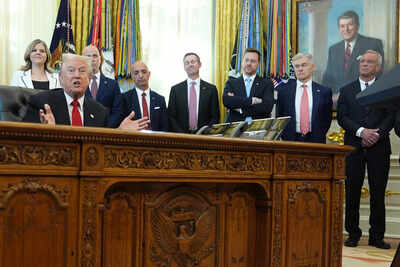ARTICLE AD BOX

President Donald Trump speaks as Heidi Overton, deputy director of the White House Domestic Policy Council, from left, David Moore, president of Novo Nordisk Inc., Novo Nordisk President and CEO Mike Doustdar, Eli Lilly CEO David Ricks, Chris Klomp, director of the Centers for Medicare and Medicaid Services, Mehmet Oz, administrator of the Centers for Medicare & Medicaid Services, and Health and Human Services Secretary Robert F. Kennedy Jr. listen during an event about drug prices, Thursday, Nov. 6, 2025, in the Oval Office of the White House in Washington. (AP Photo/Evan Vucci)
For decades, America’s war on obesity was fought with salads, gym memberships and motivational quotes. Now, it’s being fought with syringes and pills — and Donald Trump just made them cheaper.This week, the Trump administration announced a deal with pharmaceutical giants Eli Lilly and Novo Nordisk to slash the cost of blockbuster weight-loss drugs like Wegovy and Zepbound to as little as $149 a month, expanding access through Medicare, Medicaid, and direct-to-consumer sales.
America’s adult obesity rate has finally begun to dip after years of stagnation — down to 37% in 2025 from nearly 40% in 2022. The drop coincides with a surge in the use of anti-obesity drugs, now taken by roughly one in eight adults.These drugs — known as GLP-1 agonists — were originally developed to treat diabetes. But they have since transformed the way the body and brain process food, suppressing appetite, slowing digestion and curbing the urge to overeat.Clinical trials have shown benefits far beyond weight loss. Patients taking semaglutide, the active ingredient in Ozempic and Wegovy, saw significant reductions in heart attacks and strokes.
For the first time in decades, public health data suggests the needle is finally moving.Read:Needle and the Nation
At a White House event, Trump hailed the agreement as “tremendous savings,” announcing a multi-tier pricing plan designed to make obesity drugs more widely available:
- Pill versions of the drugs, expected to hit the market next year, will start at $149 a month for low doses.
- Injectable versions — Wegovy and Zepbound — will drop to an average of $350 a month, with further reductions expected over the next two years.
- Medicare patients who meet medical criteria will have co-pays capped at $50, while Medicaid users will continue to pay little or nothing.
The deal also grants the drugmakers a three-year tariff reprieve and fast-tracked FDA review for their new pill formulations. A government portal, TrumpRx.gov, will direct Americans to discounted manufacturer pricing.In typical Trump fashion, the announcement mixed policy with performance — complete with a boast that Americans could collectively lose 135 million pounds by the 2026 midterms.
For most Americans, the real barrier to joining the GLP-1 revolution has been cost. A month’s dose of Wegovy or Zepbound can range between $500 and $650, often without insurance coverage. That made the drugs a luxury item for the wealthy and well-insured.Trump’s pricing deal marks the first significant intervention to make them affordable for the middle class. It could bring millions of new patients into the fold — and reshape national healthcare spending in the process.But there’s a catch: even at $245 or $350 a month, the drugs remain expensive for those without coverage. And the eligibility rules for Medicare and Medicaid still exclude millions with mild obesity who don’t have accompanying medical conditions.Still, for an administration battling a prolonged shutdown over healthcare subsidies, this deal allows Trump to present himself as cutting costs without expanding Obamacare — turning a policy issue into a populist talking point.
The Economic and Cultural Shift
The popularity of GLP-1 drugs has quietly begun reshaping both culture and commerce. Snack food sales are dipping, fitness chains are recalibrating, and the wellness industry — long built on guilt and grit — is facing an identity crisis.Obesity, once treated as a personal failure, is now being reframed as a medical condition. “Lazy” has been replaced with “under-medicated.” The self-help industry is being overtaken by endocrinology. And Americans are finally starting to see weight loss as healthcare, not moral theatre.Economists say the ripple effects could be enormous. Fewer sick days, lower healthcare costs and higher productivity could lift the US economy by nearly a full percentage point.
But those benefits depend on sustained use and continued affordability — two things far from guaranteed.
Despite the excitement, experts warn the miracle has limits. The drugs don’t work for everyone. Many users experience nausea, fatigue or rapid muscle loss. Up to half discontinue use within a year, and a large proportion regain weight once they stop.Moreover, official data still places US obesity around 40%, meaning the reported decline could reflect optimism more than reality.
The cultural shift is real — but the biological one is still fragile.
Trump’s announcement may not end America’s obesity crisis, but it marks a turning point. It’s the first time a president has tied weight loss to public policy and made pharmaceutical intervention a populist promise. For decades, the country fought fat with willpower. Now, it’s doing it with hormones — and a price tag of $149 a month.

 3 days ago
7
3 days ago
7









 English (US) ·
English (US) ·